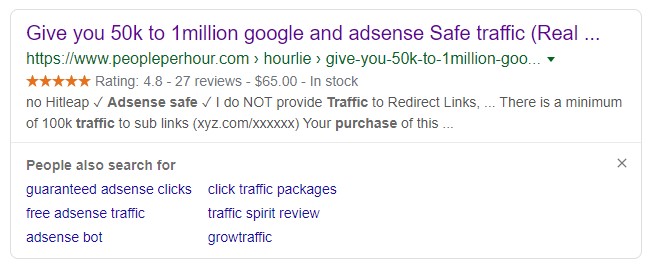Imposter Websites Are Among Us
The danger that fake, spoofed, and scam websites present is an increasing concern for both consumers and advertisers.
 With over 1.5 billion websites in existence,* digital advertisers have a vast playground in which to research, connect with, and activate consumers; but that volume brings with it another danger. On the rise in the United States and across the globe is the emergence of low-quality, unqualified sites that are purporting to be real, local news outlets. These sites, littered with out-of-date or outright false content, draw tens of thousands of impressions on an hourly basis, resulting in billions of dollars lost to ad fraud.*
With over 1.5 billion websites in existence,* digital advertisers have a vast playground in which to research, connect with, and activate consumers; but that volume brings with it another danger. On the rise in the United States and across the globe is the emergence of low-quality, unqualified sites that are purporting to be real, local news outlets. These sites, littered with out-of-date or outright false content, draw tens of thousands of impressions on an hourly basis, resulting in billions of dollars lost to ad fraud.*
Why have we seen a rise in imposter news media digital properties?
Local news media websites, whether they are from newspapers or broadcast stations, provide a trusted outlet into the community. These community institutions rank above social media (Facebook, Twitter, Instagram), online-only outlets and owned-media as the outlets most trusted by readers.* With that trust comes a large local audience and the ability to sway the audience’s purchasing behavior in favor of their advertisers. This strength comes at a steep price, the development and maintenance of a newsroom with its associated reporters and editors.
These imposter websites look to capitalize on the power of local media, and the higher CPM their quality audience brings, by pretending to be a local media outlet, but skipping out on the hard work of developing real news. These properties can be used to generate revenue or to promote a particular agenda.
How do imposters infiltrate the advertising ecosystem?
Imposter sites are created quickly with satirical content, generic stories, opinion pieces, and out-of-date information. Any content that is easy to gather and inexpensive to create is fair game for this type of predatory website. When examining a site to determine if it is an imposter, check the following:
- Do the stories have a dateline? If so, is it recent?
- Past the homepage, do the stories relate to local content? Or, is the site filled with generic, national content?
- Is the contact or about us page filled with general information and basic forms?
- Does the site have content that would attract a real human being?
If the site fails these tests, then it is most likely an imposter site. But, with low-quality content, how do these sites attract “readers”?
Buying Traffic 101
 If a bad actor would like to ramp up the traffic to their imposter site, filled with uninteresting and non-useful information, they know they cannot rely on the safe, organic-growth deployed by traditional newspaper and broadcast news properties. Instead, they turn to purchased traffic ranging in price from a $4 CPM to a $1 CPM, or even lower on the dark web. Traffic can be purchased from bot farms that are available to deliver simulated users to any website and to spoof their location information.
If a bad actor would like to ramp up the traffic to their imposter site, filled with uninteresting and non-useful information, they know they cannot rely on the safe, organic-growth deployed by traditional newspaper and broadcast news properties. Instead, they turn to purchased traffic ranging in price from a $4 CPM to a $1 CPM, or even lower on the dark web. Traffic can be purchased from bot farms that are available to deliver simulated users to any website and to spoof their location information.
A user looking to boost the traffic to their site is only a Google search away from finding their goal. With a few clicks, they can provide a vendor that will deliver a traffic boost within 48 hours to their site, powering it up to receive traffic from ad networks, guaranteed to appear as real users.
But, as these sites sweep up inventory that was destined for real news sites, they add to the ongoing issue of ad fraud in the digital advertising economy. With each impression delivered on an imposter site, an advertiser is cheated out of an opportunity to be exposed to a real consumer with actual power to purchase their goods.
How to Avoid Imposter Websites
Being cheated stinks. No one wants to lose money or miss an opportunity, but while bad actors continue to propagate imposter sites through programmatic advertising, it is a risk anyone using these services runs. Fortunately, the risks can be mitigated by using different methods:
Purchase Guaranteed Inventory Direct from Local Sites
Imposter sites cannot fake a direct buy. Real sites have sales reps, tax ids, addresses and all of the other aspects that are required for a B2B media buy for guaranteed inventory. Imposter sites do not. While the CPM cost for running directly with a local site can be higher, averaging an $8 CPM, they provide limited waste and do not purchase their traffic from a Google link, reaching real users with each advertising purchase.
Do Your Due Diligence
Under scrutiny, imposter sites fall apart. If you are running a programmatic campaign through a partner, ask them to check the domain report. A spot check of a domain report can reveal these problems, as well as other issues, and help ensure your dollars are spent on reaching real people and not going to line the pockets of a fraudster.
The team at MANSI Media is here to help you with both of these objectives.
- We make it easy for you to buy any local media website anywhere in the United States, and our team verifies they are real sites.
- Our digital experts regularly spot check our programmatic campaigns. While we love algorithms, we don’t trust algorithms. Our team puts a human set of eyes on every project.
With one call (717-703-3043) or email (Help@MANSIMedia.com), we can assist you with your next newspaper or local digital campaign.
Read More
Interested in reading more? Check out these articles to learn more about the problem facing the advertising industry.
Uncovered: 265 coordinated fake local media outlets serving Indian interests EU Disinfo Lab
Fact-checkers have debunked this fake news site 80 times. It’s still publishing on Facebook. Poynter
Simulated media assets: local news Social Puncher
Don’t get fooled by these fake news sites CBS News
